Letter From the Chair

"The ultimate measure of a man is not where he stands in moments of comfort and convenience, but where he stands at times of challenge and controversy."
- Dr. Martin Luther King, Jr.
It is indeed my honor and privilege to serve as the 2018-2021 Chair of the Board of Trustees for the Foundation for a Healthy St. Petersburg (FHSP). My tenure as Chair has not only created the opportunity to serve and lead alongside brilliant, mission-driven Board and senior staff members, but also has afforded me the opportunity to listen to, learn from, and help a community of resourceful, passionate change agents. Together, we have catalyzed opportunities to improve the wellbeing of the residents in Pinellas County with a specific focus on equity for nearly 200,000 BIPOC residents.
Reflecting on the activities and actions of the FHSP’s 2020 endeavors, I am filled with gratitude for the work of the Board, the Foundation staff, the Community, and every individual who has chosen to march to the drumbeat of race equity towards the common destination of health equity.
As an African-American woman born and raised in Pinellas County, social change through systems change is deeply personal. I bear witness to the fact that intrapersonal, interpersonal, and structural racism have shaped and impacted the lives of my family, friends, colleagues, and neighbors. I am grateful for each stage of the incremental progress we have made that energizes and reinforces the necessity of this work.
It is indeed my honor and privilege to serve as the 2018-2021 Chair of the Board of Trustees for the Foundation for a Healthy St. Petersburg (FHSP). My tenure as Chair has not only created the opportunity to serve and lead alongside brilliant, mission-driven Board and senior staff members, but also has afforded me the opportunity to listen to, learn from, and help a community of resourceful, passionate change agents. Together, we have catalyzed opportunities to improve the wellbeing of the residents in Pinellas County with a specific focus on equity for nearly 200,000 BIPOC residents.
Reflecting on the activities and actions of the FHSP’s 2020 endeavors, I am filled with gratitude for the work of the Board, the Foundation staff, the Community, and every individual who has chosen to march to the drumbeat of race equity towards the common destination of health equity.
As an African-American woman born and raised in Pinellas County, social change through systems change is deeply personal. I bear witness to the fact that intrapersonal, interpersonal, and structural racism have shaped and impacted the lives of my family, friends, colleagues, and neighbors. I am grateful for each stage of the incremental progress we have made that energizes and reinforces the necessity of this work. Rev. Dr. Martin Luther King, Jr. is quoted as saying:
The ultimate measure of a man is not where he stands in moments of comfort and convenience, but where he stands at times of challenge and controversy.
The year 2020 has been a challenging and controversial time in our history. In a climate of racial injustice, “political insurrection,” global pandemic, and economic upheaval where BIPOC populations are disproportionately perishing, we must all stand strong in this collective work.
The catastrophic events of 2020 mobilized millions across the country to reimagine systems and demand bold change. We must meet the moment with the courage, to stand steadfast and unmovable, with an unshakable grip on truth, justice, wisdom, and hope. Indeed, we must have the courage to transform and create new realities, pushing past anxiety, grief, and despair over destruction, disease, and death. I believe our Foundation and community are doing just that.
Communication from the community and our funded partners propelled the Board to reallocate funds to respond to COVID-19 immediately. Capacity-building investments (which began in 2017) with a specific focus on Black-led organizations, have been crucial in stabilizing organizations during a trying and tumultuous time of economic upheaval.
Additionally, our fellow funders in Pinellas came together to shape the Resiliency Fund, and influence the CARES Act funds to mitigate COVID, stop evictions, meet behavioral health needs, respond to food insufficiency, and advance other CDC recommendations. The Foundation provided much needed working capital through a revolving loan fund to lift organizations as they served many infrequently reached residents.
We know that the wisdom of how we must respond in times like these lies within the hearts and minds of those who care the most for our community. I send my sincere gratitude to our partners and participants for their openness and willingness to share feedback that helps us grow. This Annual Report is a testament to our collective power.
Our mission is our north star: to achieve health equity through race equity. As you read this report, the Foundation for a Healthy St. Petersburg team is already at work finessing the next steps and finding pathways to accelerate the momentum built by the community and our work together for a stronger, more equitable Pinellas County.
How blessed we are to have been born into this moment. With intentionality, it is our desire to discern the times and what we must do. The pursuit of social justice and equity urges us to lean in: to intentionally reinvent systems so that health is an equitable right for all, not a privilege for some. I envision a world where health outcomes are not predictable by the color of our skin. It is on the horizon.
Arm in arm, let us continue the good fight.
Katurah Jenkins-Hall, PhD, M.Div.
Chair, Board of Trustees
Foundation for a Healthy St. Petersburg
A Message from Randall H. Russell

"The arc of the social determinants of health universe is long, but it bends toward social justice."
- David Chokshi (National Academies of Sciences, 2019)
2020 was a harsh year; pandemic, masks, racist murders seen across the world, and the pain and anxiety of unemployment and a shaky economy. Many of us lost loved ones—over 620,000 people died in the US and at least 35,000 in Florida. More than 2.5 million Floridians have been diagnosed with COVID to date. The word “unprecedented” became conventional in 2020. There was a renewed national awareness of the modern-day impacts of systemic racism; a wake-up call which fails to mitigate the generational awareness of those who have experienced racism throughout their lives. We hope this awareness does indeed move to action. This is where the Foundation is targeted; advancing anti-racist work that builds on this awareness.
Resiliency is woven into the fabric of our humanity. When faced with injustice, we will overcome. When faced with disaster, we will rebuild. And from rubble, there will be innovation. Time is now irrevocably split, before-George Floyd, and post. “Never again” can be the launching point for a much brighter world, built from a bedrock of race equity.
I believe this to be true for a number of reasons.
2020 was a harsh year; pandemic, masks, racist murders seen across the world, and the pain and anxiety of unemployment and a shaky economy. Many of us lost loved ones—over 620,000 people died in the US and at least 35,000 in Florida. More than 2.5 million Floridians have been diagnosed with COVID to date. The word “unprecedented” became conventional in 2020. There was a renewed national awareness of the modern-day impacts of systemic racism; a wake-up call which fails to mitigate the generational awareness of those who have experienced racism throughout their lives. We hope this awareness does indeed move to action. This is where the Foundation is targeted; advancing anti-racist work that builds on this awareness.
Resiliency is woven into the fabric of our humanity. When faced with injustice, we will overcome. When faced with disaster, we will rebuild. And from rubble, there will be innovation. Time is now irrevocably split, before-George Floyd, and post. “Never again” can be the launching point for a much brighter world, built from a bedrock of race equity.
I believe this to be true for a number of reasons.
Against odds, scientists united across physical barriers, time zones, oceans, and languages to develop a vaccine in record time. A growing race equity movement took to the streets across the nation and across Pinellas County, complete with masks, marching 6 feet apart. And with the global scope of tragedy so clearly reflected on a local scale, 2020 became a year of values clarification, begging each of us to look deeper and ask “why.” And deeper yet, “Do I personally find it acceptable that someone in my city with Black or Brown skin is more likely to die 15 years earlier than someone who is White?” “If not, how can I personally take a stand against systemic racism?”
2020 also marked the 5th year anniversary of the Foundation for a Healthy St. Petersburg. This organization was founded in the belief that change, not charity, is needed to improve the health of our residents. Data continues to show us that race and ethnicity are linked to disparate outcomes for health and well-being; this requires focused investment on change. The only way to bring change is to deeply listen. Listen to people, systems, data, and actions taken by our leaders.
The past 5 years have been a masterclass in those core tenants. We have listened and adapted. Learnings from the community and the results of our annual activities have informed key shifts to the Foundation’s identity. From 2015-2017, we refined the scope of our activities to shift away from traditional, programmatic funding and toward the higher aspiration of achieving health equity. And from 2018-19, race equity to achieve health equity was determined to be the most significant focus that will propel improvements to overall population health. That is where we are today: race equity to achieve health equity to improve population health through the framework of the social determinants of health.
In the enclosed report, we share more about how the Foundation for a Healthy St. Petersburg met these moments, including tactical and strategic support for disease mitigation, a sharpening of data disaggregated by race, steps to deepen and expand education about race equity work, and the seating of the Pinellas Race Equity Leadership Council.
The Foundation celebrates the existing and outstanding leadership and efforts already taking place in the community-support and focus of these efforts by the Foundation has dramatically advanced the impact of the ongoing work. As we lean into community wisdom and cultivate an internal team composed of majority BIPOC talent, I send my sincerest gratitude to those who have shared their voice, power, and effort across the county. You shape our work and make the Foundation better. Profound thanks to our Board of Trustees who have bravely focused on the highest and best impact of the Foundation’s role over time to accomplish our ambitious vision. I’d also like to thank the amazing staff at the Foundation. Thank you for applying your talent, education, and deep relationships across sectors and within the community to advance the mission.
We are stronger together.
Randall H. Russell
President and CEO
Foundation for a Healthy St. Petersburg
Updates to the Center for Health Equity
Launched in September 2019 as a result of community listening, the Center for Health Equity is the first of its kind—a dedicated space for race equity work that creates cross-sector collaboration, fosters innovation and diversity, and invests in the wisdom of the community. The Center bridges groups of changemakers to fuel community-led solutions, spark action, and create meaningful social change. It is only through working with people across sectors that we can both hear the community wisdom and imagine ways to bring ideas from the community into action. During the Center’s inaugural period, we learned that people are not just willing to collaborate, they are hungry to meet others with similar passion and ideas. We found ways to move ideas into action dozens of times before pivoting into a digital space. Due to COVID-19, the Center’s physical space was closed on March 16, 2020. It remains closed to the public while COVID still factors into our daily lives, and future actions in 2021 will continue to prioritize the safety and well-being of our community.
Equity Education
After a successful spring of collaboration in the physical space, COVID-19 necessitated a transition to a virtual version of the Center for Health Equity. Center events are designed to propel Equity Education, which help inspire curiosity about race equity, give deeper insights into the implications of systemic racism in Pinellas County, and provide advanced training to anyone active in the mission.
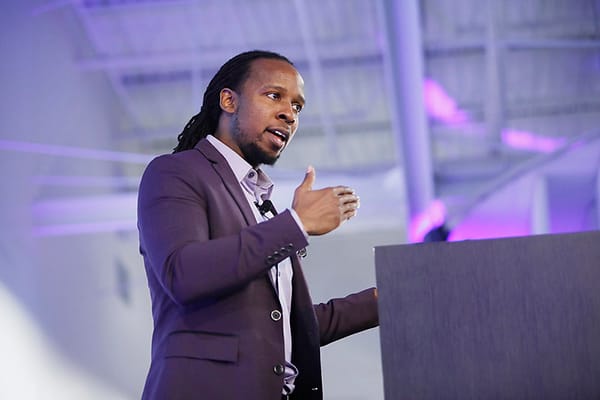
Speakers Who Inspire
Through the Speakers Who Inspire series, the Foundation connected the local community with nationally recognized speakers whose work relates to our mission of health equity through social change. Their insights and ideas informed, inspired, and motivated action toward a healthier and more equitable South Pinellas County.
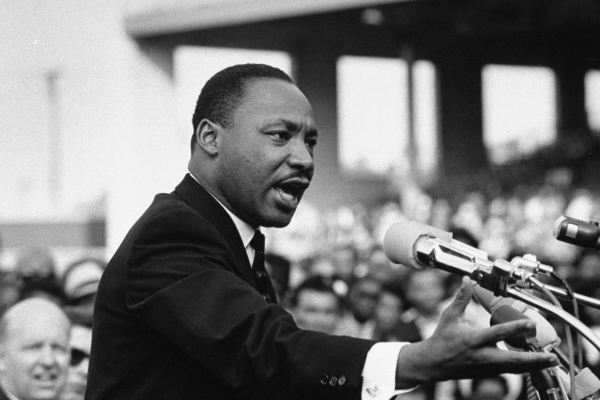
Kingian Nonviolence
In this introductory course, 77 participants received an overview of the life, work, and teachings of Dr. Martin Luther King and explored how his philosophy of nonviolence can be and has been applied in diverse settings across the globe to confront injustice and build towards beloved community. The curriculum has been taught and implemented in countries around the world, such as Nigeria, Colombia, South Africa, Mexico, and the Middle East.
In this introductory course, 77 participants received an overview of the life, work, and teachings of Dr. Martin Luther King and explored how his philosophy of nonviolence can be and has been applied in diverse settings across the globe to confront injustice and build towards beloved community. The curriculum has been taught and implemented in countries around the world, such as Nigeria, Colombia, South Africa, Mexico, and the Middle East.
By learning and analyzing Dr. King’s Six Principles of Nonviolence and six-step methodology, students became familiar with a viable, practical, and historically effective map for how to create lasting social change through nonviolent direct action and dig deep below conflicts to find true reconciliation. Using a variety of interactive techniques, participants reflected together on how to apply these teachings in our current environments.
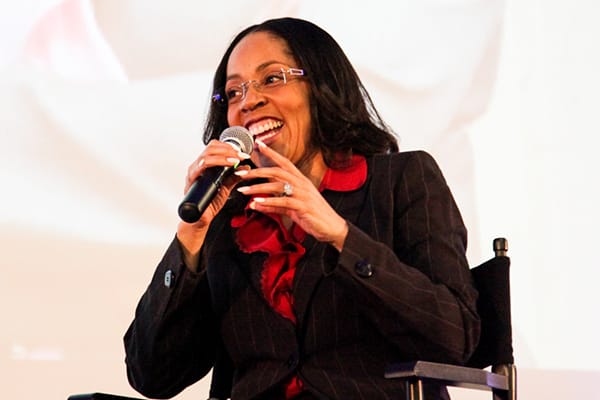
Legacy Week
Each year, Legacy Week celebrates the accomplishments, power, strength, and courage of Black leaders in the community. On February 12, 2020, the Foundation hosted a Legacy Lecture featuring State Attorney Aramis Ayala.
Each year, Legacy Week celebrates the accomplishments, power, strength, and courage of Black leaders in the community. On February 12, 2020, the Foundation hosted a Legacy Lecture featuring State Attorney Aramis Ayala.
Aramis Ayala is the first Black State Attorney in Florida’s history and a recipient of the NAACP’s 2017 Civil Rights Champion of Justice Award and Equal Justice USA’s Leadership Award.
At the Foundation’s Center for Health Equity, Aramis gave a keynote lecture, providing powerful insights that addressed poverty, mass incarceration, and other social justice issues. She described challenges faced while in office and stressed the need for Black people to remain vigilant in standing for justice.
Virtual Courageous Conversations: The Experience
Virtual Courageous ConversationsTM diversity training provides individuals and organizations with a set of tools to intentionally and effectively talk about race in support of advancing race equity to achieve health equity.
Virtual Courageous ConversationsTM diversity training provides individuals and organizations with a set of tools to intentionally and effectively talk about race in support of advancing race equity to achieve health equity.
The training fostered the development of an essential literacy, competence, and race equity lens through which to pursue systemic change at the personal, professional, and organizational levels.
Affinity Spaces
Affinity Spaces create a safe place for people of the same race to come together to learn about racism, anti- racism, racial equity, social justice, and the consequences of their racial identity within the context of white supremacist culture and history.
Affinity Spaces create a safe place for people of the same race to come together to learn about racism, anti- racism, racial equity, social justice, and the consequences of their racial identity within the context of white supremacist culture and history.
WHITE WOMEN FOR RACIAL JUSTICE IN PINELLAS COUNTY
The Foundation hosted the affinity group White Women for Racial Justice in Pinellas County, addressing the role of White women in the anti-racism movement.
Approximately 50 women committed to a 7-session series on white fragility, the history of racism between Black and White women, performative activism, power-politics-policy and race, and how to activate as a Black ally. Black mentors served as learning partners to develop the curriculum for each session and provided additional resources. Smaller breakout groups allowed participants to reflect on their personal journeys and individual opportunities for growth. The group applied Courageous ConversationTM protocol to navigate uncomfortable and challenging topics and, at the end of the year, translated their knowledge into activism and advocacy work toward systemic change.
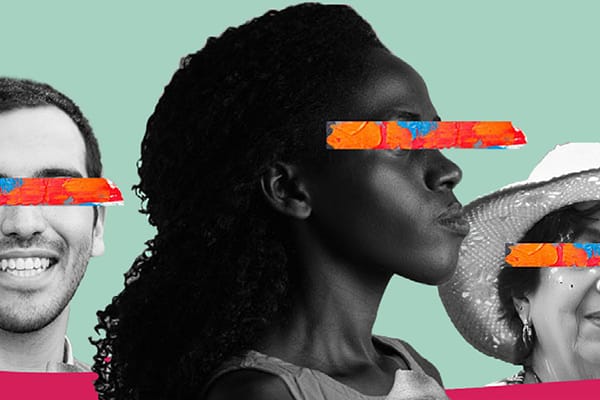
Latinx Summit
By the year 2050 there will be a large shift in the demographic make-up of the United States of America, and people of color will make up more than 50% of the population. This population deserves due recognition and consideration as the Foundation pursues equity work. Health outcomes vary by census tract, but when viewed as a whole, people of color make up the largest percentage that are out-of-care. Because the Foundation operates on a systems level, working with BIPOC is our priority, and that includes Latinx residents.
By the year 2050 there will be a large shift in the demographic make-up of the United States of America, and people of color will make up more than 50% of the population. This population deserves due recognition and consideration as the Foundation pursues equity work. Health outcomes vary by census tract, but when viewed as a whole, people of color make up the largest percentage that are out-of-care. Because the Foundation operates on a systems level, working with BIPOC is our priority, and that includes Latinx residents.
The Foundation has partnered with Estrategia Group to begin building relationships and conducting listening activities within Latinx populations throughout the County. The collaboration culminated with a powerful Summit to bring Latinx, Latino/a/e and Hispanic residents together.
¿Y DÓNDE ESTÁ MI GENTE? LATINX INVISIBLE (OCTOBER 24, 2020)
The Foundation and Estrategia Group held a community- led convening to connect with leaders who engage with or identify as Latinas, Latinos, Hispanics, and those of Spanish origin and Latin American & Caribbean nationalities and are in the pursuit of unity and equity.
Featuring keynote speaker Paul Ortiz, the convening aimed to amplify Latinx visibility and explicitly listened to the barriers and challenges to achieving health equity that exist among the Latinx, Latino/a/e, Hispanic, and Spanish-speaking people who live in Pinellas County.
Space Reflecting Community
The Center for Health Equity strives to reflect the creativity, history, and personality of the people within it. The space hosts several community- driven exhibits that complement equity work.
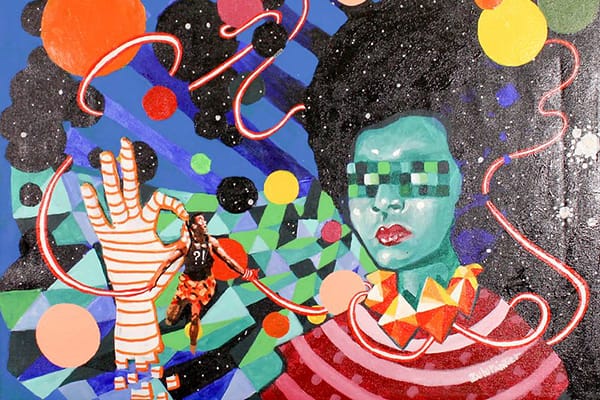
Visions of Health Equity: A Community Art Project
Artists drive innovation. They are dreamers, visionaries, and catalysts who help us better understand the world as it exists and as it could be. Visions of Health Equity united a group of local artists who shared their artistic vision of an equitable Pinellas County.
Artists drive innovation. They are dreamers, visionaries, and catalysts who help us better understand the world as it exists and as it could be. Visions of Health Equity united a group of local artists who shared their artistic vision of an equitable Pinellas County.
From a range of outstanding proposals, thirteen artists were invited to create work for the exhibit. The varied responses of these thirteen artists—all of whom were asked the same question—serves as a great reminder of the multiple perspectives, talents, and rich diversity of experiences that people bring to the table when working together to build movements and create change.
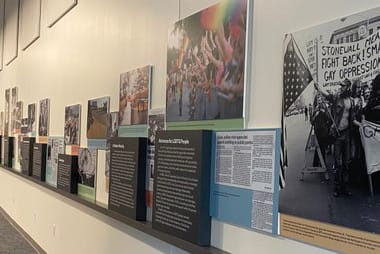
Local Highlights in Social Change History
Building an Equity Movement: A Visual History in Pinellas County - Modern day social change advocates can learn a great deal from those who have previously challenged the status quo and fought for equity.
BUILDING AN EQUITY MOVEMENT: A VISUAL HISTORY IN PINELLAS COUNTY
Modern day social change advocates can learn a great deal from those who have previously challenged the status quo and fought for equity. This installation explores some key moments in Pinellas County history when people came together to fight for their rights and strive toward a more equitable society. Due to the COVID-19 pandemic, a digital version of the exhibit was also created and shared virtually. The goal of the exhibit was to embrace Pinellas County’s heritage and inspire solidarity and resolve among today’s social changemakers.
LOOKING BACK TO MOVE FORWARD
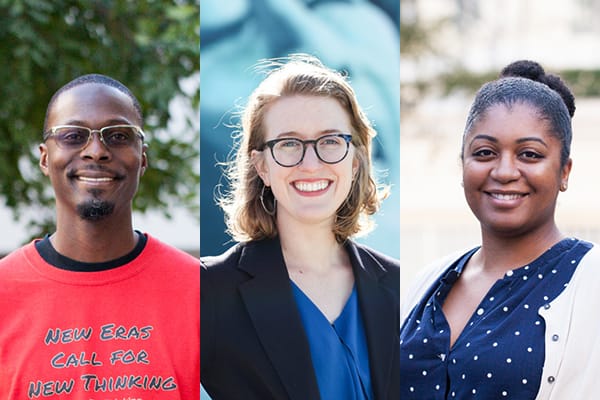
What Should the Future Hold?
As renowned photographer Eunique Jones says, "We cannot be what we cannot see." The 1,000 Voices photographic installation is an ongoing project that highlights the vision of South Pinellas community members and their hopes for a more equitable county. Several times a year, five individuals are selected to represent the campaign on the front facade of the Center for Health Equity.
Meeting the Moment: COVID Response
Crisis calls for rapid adaptation, and the Foundation board, partners, and community rose to meet the challenge. The Foundation's early COVID-19 response focused on nonprofit response, recovery, and resiliency—and on disease mitigation in the most vulnerable populations based on race and condition. The Foundation's ability to act was made possible by the bold leadership of our community partners and of our trustees, who allowed us to allocate new funds and work with funded partners to swiftly reprogram the use of millions of dollars.
Crisis calls for rapid adaptation, and the Foundation board, partners, and community rose to meet the challenge. The Foundation's early COVID-19 response focused on nonprofit response, recovery, and resiliency—and on disease mitigation in the most vulnerable populations based on race and condition. The Foundation's ability to act was made possible by the bold leadership of our community partners and of our trustees, who allowed us to allocate new funds and work with funded partners to swiftly reprogram the use of millions of dollars.
In 2020 we opened the Center for Health Equity to 2-1-1, a community partner who processed direct financial assistance from the federal government for people deeply in need. The Foundation also worked with the Community Law Program to facilitate a way to access federal dollars and avoid evictions—making landlords whole and ensuring a living environment for people who lost their income.
The Foundation hosted a COVID Town Hall and offered multiple education opportunities. Working with the Florida Department of Health and other system’s level leaders, Foundation helped trace new infections in Pinellas County by geography, race, and age—providing data points disaggregated by race.
Foundation staff embarked on a 6-month listening activity called the Deepening Project, speaking with 75 organizations about the impacts of COVID-19 (firing, hiring, emergency plan status and intentions) through over 50 questions which revealed the emerging needs of nonprofits, businesses, and other partners during the early months of the pandemic. This listening project collected meaningful contributions which in turn helped to connect residents and small businesses to financial aid and other types of support.
In addition to the $3 million in new or redirected funds, the Foundation supported disease mitigation through grass-roots marketing campaigns and deployment of masks. UNITE Pinellas led efforts on applying a race equity lens to data collection and dissemination, acting as a beacon for systems leaders on how and why data should be disaggregated by race and ethnicity.
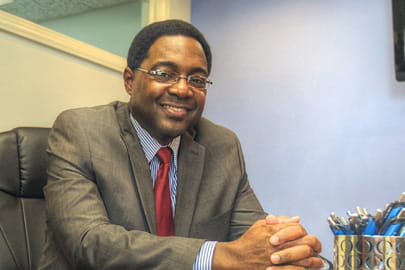
Systems Influence for CARES
Early stages of CARES funding and the American Rescue Plan Act lacked an equity lens. The Foundation worked with ONE Community and Unite Pinellas to offer feedback to government systems leaders which improved the process and allocation of funds during the second and third cycles.
Early stages of CARES funding and the American Rescue Plan Act lacked an equity lens. The Foundation worked with ONE Community and Unite Pinellas to offer feedback to government systems leaders which improved the process and allocation of funds during the second and third cycles.
The Foundation held virtual training sessions on how to apply for CARES funding in September and October, hired three grant writers to support community applications, and created a 0% interest bridge loan program through the Tampa Bay Black Business Investment Corporation. The loan fund helped small businesses and nonprofits to apply for CARES support, while stabilizing their infrastructure until the federal rebates could be obtained.
#InThisTogether
150+ community leaders co-signed a request for equity that was sent to Pinellas County leadership. In the subsequent weeks, representatives from both groups helped shape a $30 million investment in nonprofit navigation services for community residents and a Business Diversity Micro-Grant Program. The Micro-Grant Program created targeted support for entrepreneurs who needed help meeting eligibility guidelines for CARES grants of up to $10,000.
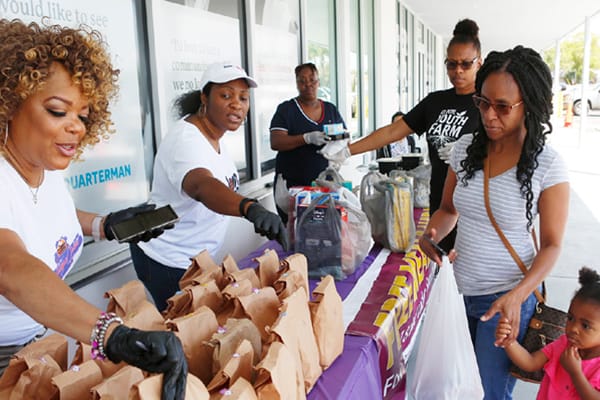
Love Lunches
School closures due to COVID-19 impacted life for Pinellas County residents in many ways. As families strived to find alternatives to childcare, move towards virtual education, and manage employment concerns, a group of local leaders united to alleviate one problem: access to nutritious meals.
School closures due to COVID-19 impacted life for Pinellas County residents in many ways. As families strived to find alternatives to childcare, move towards virtual education, and manage employment concerns, a group of local leaders united to alleviate one problem: access to nutritious meals.
According to 2019-2020 data from the Florida Department of Education and Pinellas County Schools, between 55,000- 60,000 youth are eligible for free or reduced lunches in Pinellas county; 60% of all students. Pivoting to address the new challenges caused by closures, a consortium of community initiatives have joined forces to offer Love Lunches; free meals, made with love, for local children.
The Love Lunches program was offered at the Center for Health Equity from March through May, 2020.

Improving Access to Food
Unemployment increased drastically during 2020 due to the economic impact of COVID-19. The Foundation for a Healthy St. Petersburg contributed to community efforts to distribute nutrition to those in need through several efforts, including a collaboration with Feeding Tampa Bay, the Warehouse ArtsXchange, the St. Pete Police Department, the City of St. Pete Transportation, Deuces Live, GoZone, St Pete College, Grow Smarter St. Pete, and the Homeless Leadership Alliance, who joined forces to donate masks and 7,500 meals (9,000 pounds of food!) at the ArtsXchange in April 2020.
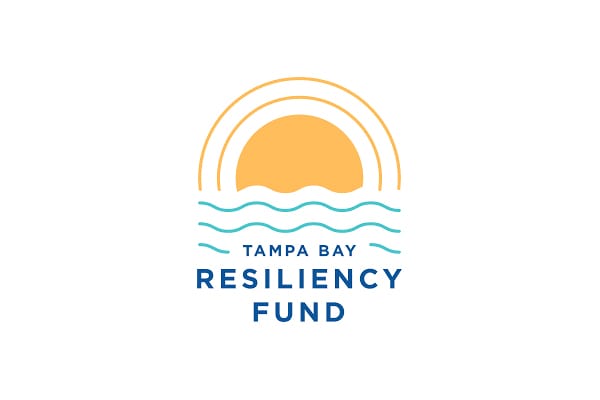
Tampa Bay Resiliency Fund
The Tampa Bay Resiliency Fund was a strategic collaboration of the Pinellas Community Foundation, Allegany Franciscan Ministries, Foundation for a Healthy St. Petersburg, and United Way Suncoast. The fund was launched in April 2020 and contributed over $1.5 million of funding assistance to nonprofit 501(c) organizations and governmental agencies.
The Tampa Bay Resiliency Fund was a strategic collaboration of the Pinellas Community Foundation, Allegany Franciscan Ministries, Foundation for a Healthy St. Petersburg, and United Way Suncoast. The fund was launched in April 2020 and contributed over $1.5 million of funding assistance to nonprofit 501(c) organizations and governmental agencies. Intended to help fill critical gaps that were unaddressed by federal, state, and local government, the Resiliency Fund prioritized three categories: protection of human life, mitigation of additional harm, and strengthening nonprofits related to critical intervention services for the community.
- Total Contributions to the Fund: $1,539,884.30
- Total Amount of Grant Funding Distributed: $1,512,124.81
- 78 Organizations Helped
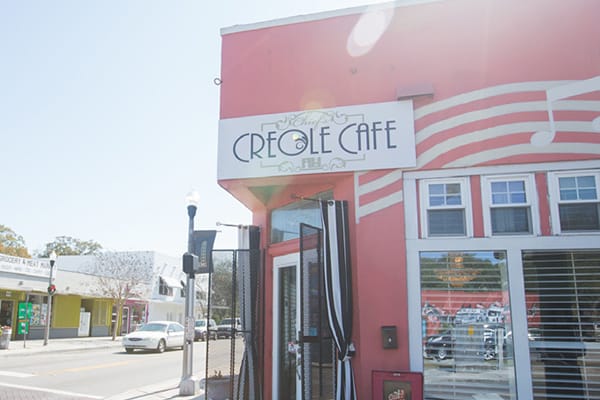
Grow Smarter
Grow Smarter St. Petersburg is an equitable economic development initiative based at the St. Petersburg Chamber of Commerce and primarily funded by the Foundation. As the pandemic progressed, Grow Smarter reallocated funds to best serve the community. They pivoted funding allocation, suspended monthly working group activities, distributed masks, coordinated business navigators, and founded a scholarship.
Grow Smarter St. Petersburg is an equitable economic development initiative based at the St. Petersburg Chamber of Commerce and primarily funded by the Foundation. As the pandemic progressed, Grow Smarter reallocated funds to best serve the community. They pivoted funding allocation, suspended monthly working group activities, distributed masks, coordinated business navigators, and founded a scholarship. Despite every change, their mission—to reduce gaps by race and place in St. Petersburg by introducing equity to economic development efforts—remained the same.
Grow Smarter focused resources in the following three areas:
RESOURCE SUPPORT IN SOUTH ST. PETERSBURG
- $25,000 was provided to One Community’s microgrant program. One Community distributed these grants to business owners in the beauty industry, creatives, and other hard-hit industries like daycare centers.
- Grow Smarter assisted in creating 3 GoZone Wi-Fi Hotspots in Warehouse Arts District, Child's Park and Tangerine Plaza, and underwrote free Wi-Fi in the Deuces Live corridor as part of the digital inclusion committee.
INVESTMENT IN EDUCATION & COMMUNITY
- Grow Smarter Scholarships were provided to 14 students. The total investment was $25k and helped students to pursue certification programs in the Grow Smarter targeted industry areas (Financial Services, Creative Arts & Design, Marine and Life Sciences, Specialized Manufacturing, and Data Analytics).
BUSINESS RESILIENCY TEAM
Emergency-response team of navigators was created to connect local businesses in need with resources and/ or subject matter experts. Emphasis was given to minority and women-owned businesses and sole proprietors throughout St. Petersburg.
- 221 businesses contacted and provided resources
- 107 received advanced navigation
- Over 60% were minority and/or women-owned businesses
- 61% smaller brick and mortar businesses
- 13.4% businesses supported were home-based
Unite Pinellas Highlights
Data is crucial in validating initiatives that drive narrative change, institutional behavioral change, and policy change. UNITE Pinellas led the county in several large-scale assessments, including the Equity Profile released in April of 2018.
Data is crucial in validating initiatives that drive narrative change, institutional behavioral change, and policy change. UNITE Pinellas led the county in several large-scale assessments, including the Equity Profile released in April of 2018.
In 2020, UNITE published a new website and a valuable new tool— the Race Equity Data Explorer. This database helps users connect history and current policies to impacts on communities of color. All the data and information are also available as printed materials so the tools can be used by residents without high-speed internet. With a combination of data and the wisdom of people with lived experience, it is possible to create approaches that will have the deepest impact.
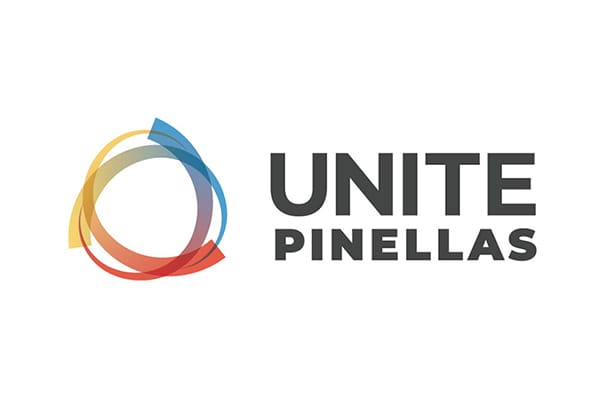
COVID-19 Tracker
In response to the COVID-19 Pandemic, UNITE Pinellas launched a “COVID Tracker.” Dr. Stephanie Reed, MPH used the dashboard to visualize county data by race and ethnicity as rates which are standardized by each population. As a social epidemiologist, Reed believes it is vital to develop the tracker to specifically show how deeply the disease has impacted Black and Brown communities.
In response to the COVID-19 Pandemic, UNITE Pinellas launched a “COVID Tracker.” Dr. Stephanie Reed, MPH used the dashboard to visualize county data by race and ethnicity as rates which are standardized by each population. As a social epidemiologist, Reed believes it is vital to develop the tracker to specifically show how deeply the disease has impacted Black and Brown communities.
Read more about the importance of standardizing data via rates.
"By looking deeper into data provided by the FL-DOH and the county, we can better understand the impact of COVID on communities of color in our area, and compare how rates fare against the state as a whole. Knowing the history of racism in America, it is appropriate to look at the impact by race and appropriate to look at the impact of racism on COVID-19."
- DR. STEPHANIE REED
The COVID Tracker reveals the rates of COVID illness, hospitalization, and deaths, among “Blacks, whites and others”. It also collects data from those identifying as “Hispanics” across the three groups. Reed noted that the “other” population includes people who identify as American Indian/Alaskan Native, Asian and Native Hawaiian/Pacific Islander, as categorized by the Florida Department of Health.
By focusing on disaggregated data by race, and then calculating rates of COVID-19 per 100,000 residents, UNITE was able to get a better understanding of the effects of COVID on racial/ethnic groups. In turn, this helped equity professionals to advocate for additional resources, support, and campaign strategies to reach communities of color in a meaningful way.
The following chart depicts the percentage of Pinellas County residents who have been fully vaccinated against COVID-19 within each racial/ethnic group. Latinx residents may be of any race.
As vaccinations became available in the county, the COVID Tracker was expanded to show vaccination uptake by race and ethnicity and age group.
Visit unitepinellas.org.
On the Ground Activities
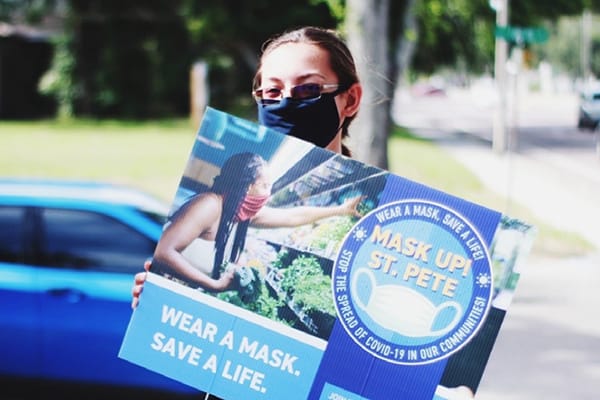
Mask-Up St. Pete Campaign
A consortium of St. Petersburg community partners came together to launch MASK UP! ST. PETE which focused on the life- saving benefits of face masks in slowing the spread of COVID-19. The project was designed simply to spread the word that “wearing masks can save lives.” A combination of government and grassroots distribution efforts provided free, reusable cloth masks to county residents. The Foundation supplied 10,000 masks at the request of the Pinellas County Government, and volunteers organized a distribution network prioritizing the most affected areas in South St. Petersburg.
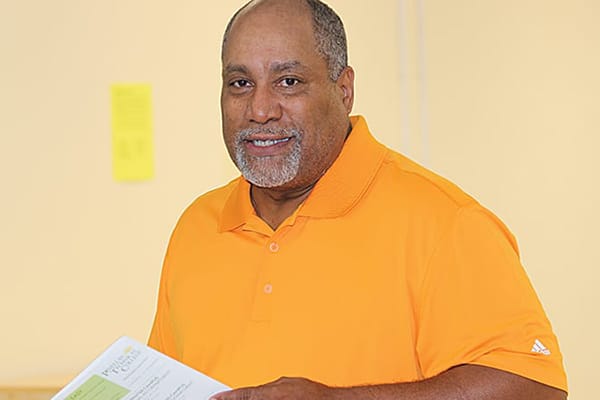
Equity Now! Radio Show
‘Equity Now’ investigates race equity to achieve health equity in population health — especially for Black and Brown people. Each week, Carl Lavender, Chief Equity Officer at the Foundation, hosted an engaging conversation with a featured guest to address community needs and issues. Conversations covered mental and behavioral health, COVID-19 precautions, and the housing and eviction crisis, among other topics.
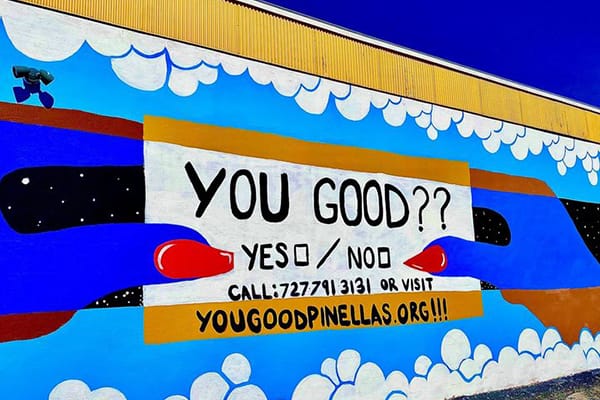
YOU GOOD? Campaign
Among the many stresses of 2020, individuals struggled to cope with the impacts of COVID-19. The YOU GOOD? Behavioral Health Campaign was designed to create a single, unified point of access for mental health, behavioral health, and substance abuse resources for Pinellas County residents. Many organizations from across the county collaborated to form a continuum of care. This meant that with one number, and one website, residents could be connected to the appropriate resource to get the support they need.
CREATING A CONTINUUM OF CARE
Among the many stresses of 2020, individuals struggled to cope with the impacts of COVID-19. The YOU GOOD? Behavioral Health Campaign was designed to create a single, unified point of access for mental health, behavioral health, and substance abuse resources for Pinellas County residents. Many organizations from across the county collaborated to form a continuum of care. This meant that with one number, and one website, residents could be connected to the appropriate resource to get the support they need.
DESTIGMATIZING MENTAL HEALTH
The campaign also served to help destigmatize mental health. The casual tone helped build conversations with loved ones. Checking in on a friend by asking, “You good? No really... Are you good?” encouraged the listener to prompt for deeper responses, creating space for authentic conversations to take place. In addition, a suite of branded images made it easy to share the resource and conversation starters on social media. Because the campaign was approachable, it was adopted by the community at large and widely shared. By emphasizing how we take care of ourselves, our emotions, and each other, YOU GOOD? supported community health in the county.
COLLABORATING WITH THE ARTS COMMUNITY
Art has the power to connect and unite. The Foundation partnered with Creative Pinellas to broadcast calls to artists to do creative work around mental health, behavioral health and addiction issues. Mini-grants associated with the YOU GOOD? campaign served a dual purpose, helping provide funding to artists who were economically impacted by the pandemic and creating brilliant interpretations of mental health awareness. Murals made the campaign even more accessible to the community and coincided with the SHINE Mural Festival.
Leading with Faith and Equity During COVID-19
Faith leaders are trusted advisors and pivotal advocates for sharing accurate information to large networks throughout the county. Pastors, priests and ministers were supported by the Foundation for a Healthy St. Petersburg and the Florida Department of Health in developing a series of online seminars to help prepare faith leaders to best serve the community during this tumultuous season.
(MAY 8-JULY 24, 2020)
Faith leaders are trusted advisors and pivotal advocates for sharing accurate information to large networks throughout the county. Pastors, priests and ministers were supported by the Foundation for a Healthy St. Petersburg and the Florida Department of Health in developing a series of online seminars to help prepare faith leaders to best serve the community during this tumultuous season.
The webinars provided an applicable roadmap on how to deal with the crisis and shared best practices, insights, data, recommended health guidelines and considerations for reopening centers of worship, and resources for ongoing recovery. Panelists included Department of Health staff members leading the local public health response to COVID-19, a Chaplain of a local hospital system, and community members who previously tested positive for COVID-19.
Accelerated National Awareness and Readiness
People throughout the nation and the world called for justice and the end to the racial discrimination that infects societies and the systems that govern our lives. From the brutal murder of George Floyd to the disproportionate impact of COVID-19 on the Black community, unfolding events lent fresh urgency to the call for Race Equity. Now!
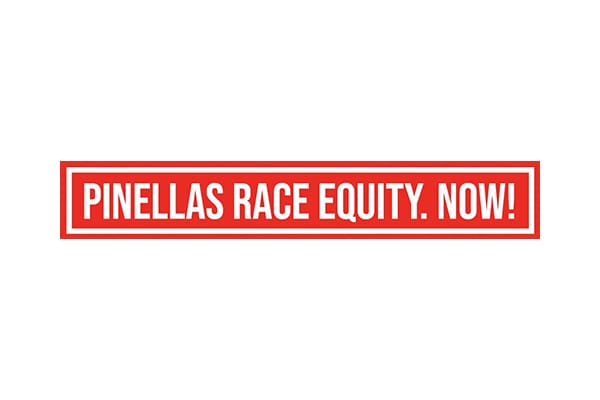
Pinellas Race Equity. Now!
The Foundation’s virtual Race Equity. Now! Webinar Series invited thought-provoking speakers to share about local issues and inspire change. The Race Equity Pledge gave community members the opportunity to pledge their support for race equity, commit to concrete anti-racist actions, and receive information and resources to start or continue their race equity journey.
Race Equity. Now! Webinar Series
‘Equity Now’ investigates race equity to achieve health equity in population health — especially for Black and Brown people. Each week, Carl Lavender, Chief Equity Officer at the Foundation, hosted an engaging conversation with a featured guest to address community needs and issues. Conversations covered mental and behavioral health, COVID-19 precautions, and the housing and eviction crisis, among other topics.
WHITE SUPREMACY AND BLACK LIVES MATTER (JULY 29, 2020)
Foundation President and CEO Randall H. Russell provided an update on the Foundation’s COVID-19 response and opportunities for accelerating the race equity movement. This was followed by a moderated discussion of community activists leading disruption and peaceful protest for social change and racial justice.
EQUITY DATA: WHAT WE HAVE AND WHAT WE NEED—IMAGINING THE EQUITY DATA THAT INSPIRES SYSTEMS CHANGES (AUG 5, 2020)
In 2019, An Equity Profile of Pinellas County was published illustrating how disparities in income, housing, educational attainment, and many other areas are costing Pinellas County billions of dollars in potential economic growth each year. The Profile offered several promising strategies that have been used across the country to eliminate barriers and advance equity. This webinar revisited those groundbreaking findings and explored significant countywide racial disparities and practical strategies for achieving equity and prosperity. An expert panel imagined the data that could unlock real systems change, how to get there, and how to continue to improve on equity data collection.
Moderated by Carrie Hepburn, the expert panel included local practitioners Gwen Reese, Tim Dutton, Jaclyn Boland, Judith Scully, Dr. Stephanie Reed, and Gypsy Gallardo.
RACE EQUITY AND THE ECONOMIC RESPONSE TO COVID-19: THE STATE OF SMALL BUSINESS RELIEF AND RECOVERY (AUG 12, 2020)
The COVID-19 pandemic hit small business owners— especially those who are people of color—extremely hard. Yet when relief and recovery resources were distributed, they did not benefit proportionately.
In this event, a panel of experts gathered to discuss efforts to disrupt this cycle of discrimination and ensure that race equity plays a part in the awarding of grants, loans, and relief dollars in Pinellas County.
Hosted by Carl R. Lavender, Jr., and moderated by Dr. Cynthia Johnson, the expert panelists included Mike Meidel, Gypsy Gallardo, Esther Eugene, Veatrice Farrell, Jocelyn Howard, Hillary Van Dyke, and Josh Bean.
YOU ARE NOT ALONE: RACE, HEALTH AND GENERATION NEXT: EQUITABLE EDUCATION FOR ALL! (AUG 19, 2020)
The Foundation recognizes the importance of equipping communities, educators, and families with resources that empower students of all ages (PreK- Grade 12) to continue pursuing their educational goals, while supporting their caretakers in the process. This discussion featured community experts at the intersection of health, education, and race equity.
Hosted by Dr. Keesha Benson and moderated by Delquanda Turner Smith, Harold Bryant, and Carrie Hepburn, the expert panel included Patrick Diggs, Kevin Hendricks, Dr. Bilan Joseph, Dr. Stephanie Reed, Bridgette Heller, Dr. Sydel LeGrande, Denise Ford, Erin Savage, Sharlene Edwards, Rafael Robinson, and Hillary Van Dyke.
ART. REALITY. BLACK LIVES MATTER: A MURAL DISCUSSION (AUG 26, 2020)
Artists drive innovation. They are dreamers, visionaries and catalysts that help us better understand the world as it exists and as it could be. Moderated by Terri Lipsey Scott, this exciting webinar featured the creative renderings and insights of the sixteen artists who crafted the Black Lives Matter Mural positioned in front of the Dr. Carter G. Woodson African American Museum in St. Petersburg, FL. Artists shared more about their letter and process, and expressed their interpretation of the current race equity moment post George Floyd, the ongoing tragedies faced by Black people at the hands of police departments, and the acceleration of the Black Lives Matter movement.
ON THE GROUND: YOUTH ACTIVISM (SEPT 30, 2020)
This lively and illuminating conversation elevated the voices of young activists and asked them to share their experiences and battles with issues like state violence, racism, homophobia, climate change, school shootings, and a global health crisis. The event advocated for inviting young people to the table for conversations about equity and encouraged established decision-makers to act in support of our future equity leaders.
Hosted by the Young Equity Advocates (YEA) Collective and co-moderated by organizers Marcus Brooks, Shaquira Robinson, Bianca Mieses, and Alyssa Bedard, this event featured youth activists Deniel Espada, Kyla Martin, Shimya Mitchell, and Aaron Gilmore.
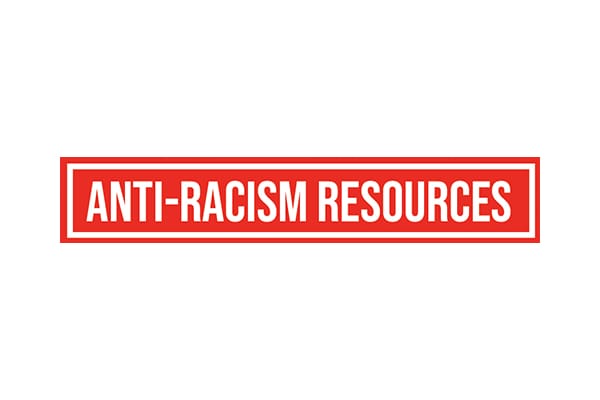
Anti-Racist Resources
National and global outcry following the publicized murder of George Floyd meant the general public showed a willingness to lean into equity work on a greater scale than ever before. To accelerate impact based on community sentiment, the Foundation published 57 resources on things to do, things to read, and things to act on.
Pinellas Race Equity Leadership Council (PRELC)
The PRELC is a purpose-built assembly that prioritizes equity. The purpose and sole measure of success is to achieve racial equity in St. Petersburg and Pinellas County. The group—a small, but dynamic number of key subject matter experts, community members, civic leaders, government officials, faith leaders, and business and nonprofit chief executive officers—is fully supported to work together to affect transformative social change.
The PRELC is a purpose-built assembly that prioritizes equity. The purpose and sole measure of success is to achieve racial equity in St. Petersburg and Pinellas County. The group—a small, but dynamic number of key subject matter experts, community members, civic leaders, government officials, faith leaders, and business and nonprofit chief executive officers—is fully supported to work together to affect transformative social change.
The Foundation created a dashboard of indicators to inform PRELC strategies and demonstrate how racial inequities are perpetuated across the entire life course of Black residents. Data points demonstrated racial inequities in every stage of life that resulted in high morbidity rates and lower life expectancy for Black residents.
The PRELC Issue Brief provided a deeper dive into our initial measures of race equity for our county. As the PRELC progresses, measures will be more refined and other ideas will continue to emerge.
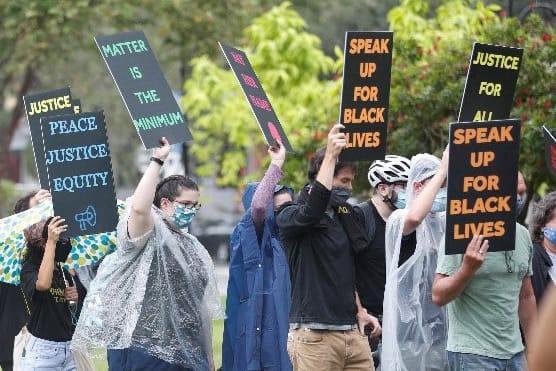
Movement St. Pete
The Foundation supports peaceful and purposeful protests which galvanize a movement of solidarity.
The Foundation supports peaceful and purposeful protests which galvanize a movement of solidarity.
The St. Petersburg Peace Protest marched for over 100 consecutive days after the death of George Floyd. As momentum was gained, advocates of race equity and social justice gathered to demand justice and to uplift the equity movement. In September, they helped plan an anti-hate rally and vigil at South Straub Park and the St. Pete Pier.
The Foundation aimed to meet the needs of the community by uplifting the St. Petersburg Peace Protest, fabricating materials, helping to unify and set a cohesive list of requests, and offering mental health resources for activists.
The Community Pulse
There are many ways to support the needs of Pinellas County Residents, both at a systems and hyper-localized level. In fact, it is the delicate tension between those two which can strengthen impact. In 2020, with the help of grassroots leaders, the Foundation launched deep listening activities, and participated in census awareness and completion initiatives that led to an increase in federal funds. The Foundation also deployed resources to form support and solutions for the looming eviction crisis and fought to improve access to the internet and technology through a Digital Inclusion effort.
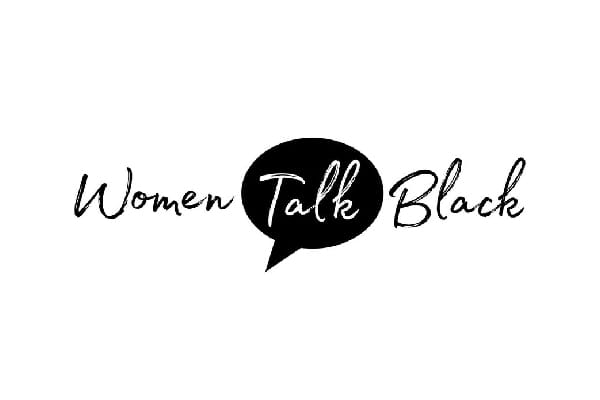
Get Out the Vote
Get Out the Vote is a project of Women Talk Black and the Dr. Carter G. Woodson African American Museum. In 2020, Get Out the Vote harnessed the power of Black women’s voices and increased Black women’s participation in leading efforts to engage in their communities and drive changes in voting behavior in the rising American electorate. Using data to drive a targeted campaign, culturally relevant, credible facts were communicated through the trusted messaging of Black women’s perspectives and stories. These messages were complemented with proven tools and actions through which Black Women could realize, develop, focus, and leverage their power to influence others.
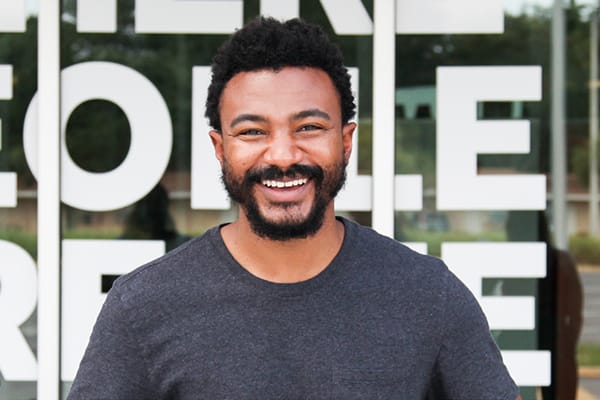
RELS
The Race Equity Listening Initiative was an avenue to gain understanding about lived experiences and the views of stakeholders of the St. Petersburg community as it relates to race equity, COVID, and important present-day issues.
The Race Equity Listening Initiative was an avenue to gain understanding about lived experiences and the views of stakeholders of the St. Petersburg community as it relates to race equity, COVID, and important present-day issues.
Race Equity Listeners are known community partners who are Affiliate Practitioners of Courageous Conversations About RaceTM, and/or have completed Master Class Facilitation training.
From July-September 2020, the RELs held 144 listening sessions with Pinellas County residents to learn more about lived experience, Gifts and Assets within the Community, and “Agenda-less Listening.” Key insights were gained about COVID-19, politics, technology, experiences with racism, and more.
- There is a need to get youth/young adults more invested in voting
- There is a need for a resource-list that can easily be distributed to families who need help
- There is concern about "loss of community"
“I have found that when we say neighbors, we don’t mean go people we bake a pie for and deliver to their stoop. We are just saying that person lives in very close proximity to me. It’s difficult to even know what issues we can solve together because there really isn’t a mechanism in place to hold that kind of conversation. Sure, we’ve got a Facebook group for the neighborhood, but it is where people complain mostly. It’s not built for coalition building...We don’t know each other but I bet we’ve got the same issues that we are facing. That’s just it right? We face the same issues, but we are doing it alone. We are doing it in silos.”
Listening activities from the Race Equity Listeners informed Foundation’s support of census and voting education campaigns, the investment in building continuums of care, and the delivery of paper resources in neighborhoods through street teams, among other actions.

Census
An accurate census count helps make sure we receive the funding we need for our community. Due to the pandemic, 2020 became the first year the census could be completed online. Due to digital equity issues, a mistrust of government, and language barriers there was increased risk that historically undercounted neighborhoods would face even steeper challenges in 2020.
LOVE MY NEIGHBORHOOD CAMPAIGN
An accurate census count helps make sure we receive the funding we need for our community. Due to the pandemic, 2020 became the first year the census could be completed online. Due to digital equity issues, a mistrust of government, and language barriers there was increased risk that historically undercounted neighborhoods would face even steeper challenges in 2020.
As a result, the Pinellas Complete Count Committee created several outreach campaigns. More than 170 partners across the county collaborated to help reach over 25,000 people in local events. The social media campaigns resulted in 685k+ organic impressions and 6750 clicks (~7% conversion rate) back to My2020Census.gov.
In 2010, Pinellas County’s final self- response rate was 64.8%. This rate was surpassed in 2020 with a 67% self-response rate. This 2.2% increase represents approximately 21,700 people. It is estimated that for every person counted, $950 in federal dollars is distributed to the area.
The well-trained and passionate street teams made a big difference in the ability to surpass the 2010 census count. The street teams were composed of trusted community partners who eliminated language barriers in the Latinx communities and engaged directly with residents to educate and remove mistrust related to the census. These teams were mobilized by several partners on the Sub- Committee such as the Community Development and Training Center (CDAT) and the Hispanic Outreach Center (HOC). In addition, the City of Largo mobilized City employees in an effort to achieve a more accurate count.
HISPANIC OUTREACH CENTER ACTIVITIES
The HOC team conducted door-to-door outreach weekly and outreach at an HOC event/activity each week, resulting in engagement with over 1,400 households. More than 230 households completed a Google survey about the census and intentions to complete it, with text and phone follow-up with those who had not completed the census. Census flyers and materials were distributed at 53 locations in North Pinellas County (Hispanic businesses, shops, churches, etc.). These efforts increased participation in the 2020 census from the Hispanic community.
THE CENTER FOR DEVELOPMENT AND TRAINING (CDAT) ACTIVITIES
The CDAT Team mobilized 14 people per day for 19 days and assisted 759 residents in completing the census. Nearly 1063 households were visited and more than 3,800 county residents were engaged.

Eviction Crisis
The Pinellas Eviction Diversion Program (PEDP) was launched in Pinellas County in October 2020 as a homelessness prevention project of the Community Law Program.
The Pinellas Eviction Diversion Program (PEDP) was launched in Pinellas County in October 2020 as a homelessness prevention project of the Community Law Program.
The program provides virtual mediation and rental assistance funding for both landlords seeking back payment and tenants who have fallen behind in rent payments, or who were at risk of eviction. The Community Law Program also acted as an aggregate of resources and directed residents to support such as transportation services, and clothing and food for children whose families have been affected by eviction.
PEDP highlighted that their ability to move funds quickly into the hands of landlords, shortening a process that previously could take many months to about two weeks, helped drive landlord buy-in and participation. PEDP also prioritized outreach where people who needed assistance were likely to congregate, such as barber shops and neighborhood cultural centers.
PEDP was featured in a brief by the Urban Institute as an exemplary model showcasing the need for eviction prevention and diversion programs to center equity in their program design and outreach.
Locally, PEDP helped 315 households from September 1, 2020 through December 31, 2020.
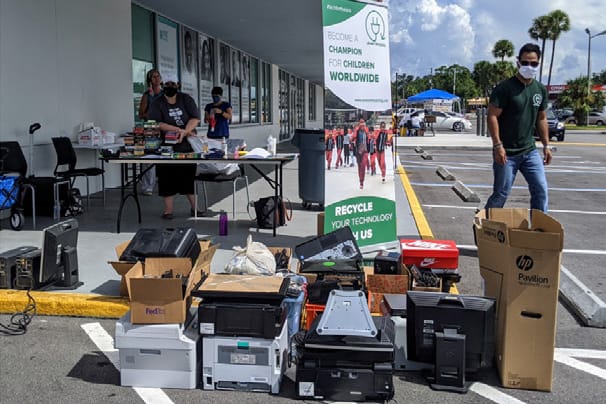
Digital Inclusion
A digitally inclusive city is one where all individuals have access to online resources, as well as the skills to use them meaningfully. This is necessary for lifelong learning, employment, civic participation, and the ability to reach essential services. Though many individuals possess smartphones, that is not enough to fully participate in the digital economy. Based on national reports and initial local data analysis, the digital divide is magnified for individuals of color and low-income households. A national report found that half of Black workers and more than half of Latinx workers need digital skills training.
A digitally inclusive city is one where all individuals have access to online resources, as well as the skills to use them meaningfully. This is necessary for lifelong learning, employment, civic participation, and the ability to reach essential services. Though many individuals possess smartphones, that is not enough to fully participate in the digital economy. Based on national reports and initial local data analysis, the digital divide is magnified for individuals of color and low-income households. A national report found that half of Black workers and more than half of Latinx workers need digital skills training.
In the South St Petersburg Community Redevelopment Area (CRA), 44.4% of households with income of less than 20K are without an internet subscription and 27% of households with income of 20K to 75K are without an internet subscription.
The Deuces Live District and St. Petersburg Innovation District have convened a group of government, industry, nonprofit, and other organizations to find solutions to bridge the current digital inclusion gaps. The conversations started in December as part of the next wave of smart city activities led by the St. Petersburg Innovation District. With the onset of COVID-19, the working group pivoted from planning to address immediate needs. The group responded by expanding internet access, distributing laptops and tablets, and providing technical assistance. The workgroup will continue building long-term plans to enhance digital equity in the city.
As a result of digital equity efforts by the Pinellas County School Board, and the Pinellas Education Foundation, WiFi became available to all Pinellas County School Board students from 2019 on – prior to that an estimated 5,500 students did not have WiFi access at home.
DIRECT SERVICE
Assistance provided to individuals to navigate a current crisis situation. This is the most immediate response to a social injustice. Direct services may also be used as part of a comprehensive approach to power building and change, such as skill or capacity development opportunities that are longer term such as leadership development or enhance vocational skills.
Mission Investment Reports
$6,654,070
Mission Investments Total
$1,634,945
COVID-19 Response
$1,921,545
Community Grantmaking and Investments
$1,392,682
Movement Building
$367,532
Convening People for Solutions
$529,386
Policy and Research
$807,980
Center for Health Equity (includes COVID-19 and other activities)
$8,270,409
Operating Expenses Total
Strategic Objectives
The Foundation has allocated program expenses to the following 2020 strategic objectives:
COVID-19 Response
During 2020, the coronavirus outbreak deeply impacted Black, Indigenous and People of Color disproportionately. The Foundation met community needs through strategic grantmaking to support Black and Brown businesses, nonprofit support for their employees and clients, the provision of the 15,000 square feet of finished space at its Center for Health Equity for programs supporting the needs arising from the pandemic, the establishment of a working capital loan fund for CARES Act grant recipients, and through town halls, information dissemination, and systems influence. Current year expenses in support of its COVID-19 Response are separately allocated to costs of maintaining the Center for Health Equity and to grants and other community support.
Grantmaking & Community Investments
The Organization provides support to nonprofits and the local community in the form of grants, staff expertise and other direct support. These investments to community partner organizations were focused on enhancing the race equity movement in Pinellas County. The grant awards in 2020 included fueling multiple systems changing transformative grants including infant trauma, HIV, job creation, and mental health. Grants are awarded to involve multiple sectors, all focused on race equity to achieve health equity improving population health.
Equity Movement Building
The Organization accelerates social change to advance health equity through race equity; this approach in part is powered by a multi-sector (faith, private, public, nonprofit/community) multi-tiered (system leaders, grass top leaders, grassroots people with lived experience) movement across the County. Moving along the continuum from awareness to action in the fulfillment of a social change mission involves a multi-faceted approach to community engagement. This includes education and awareness building with multi-platform messaging, gauging community needs through strategic listening, and cultivating opportunities for deeper engagement in race equity. A primary element of this work is the Organization’s listening agenda to ensure lived experiences are brought to system leaders.
Convening People for Solutions
The Organization convenes people (lived experience, leaders, content experts) across sectors and organizations to create change. The Organization sponsors multi-sector and mixed-race gatherings and convenings as a powerful tool for community building and problem solving. To empower groups to gain momentum on their social change and systems change agendas, the Organization sponsored training for staff and community leaders in nonviolent conflict resolution and facilitation skills.
Policy & Research
The Organization actively works to influence social policy through data, analysis, and solutions. Those solutions then require advocacy efforts to inform the systems and leaders who can change policies of suggested changes that will lead to race equity. In order to thoroughly support policy analysis the Foundation includes research and data collection, evaluation, public education, and other initiatives to influence policies in pursuit of the Organization’s mission.

